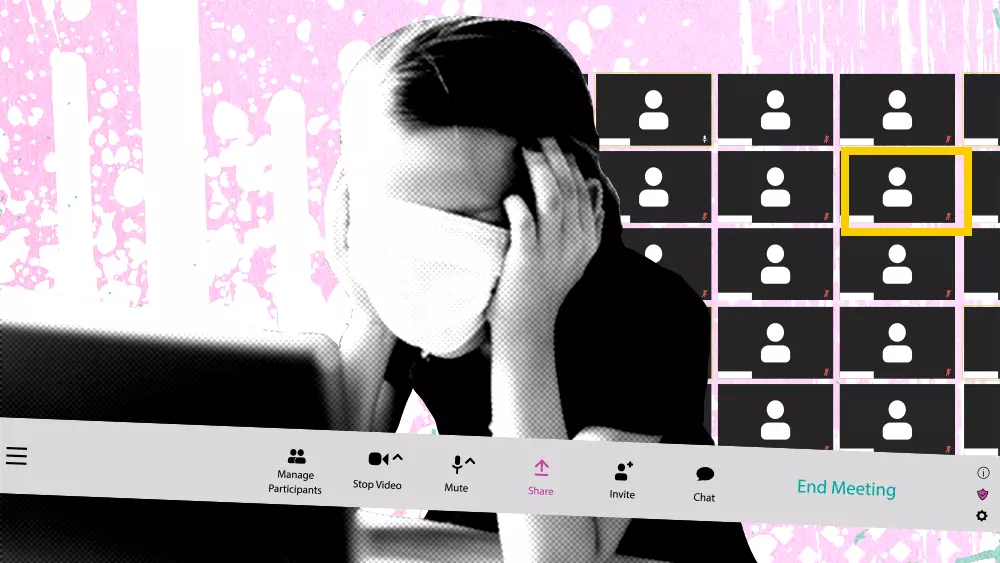health
psychology
The new social disorder that the corona has created in many
We all forgot about FOMO during the closures of the past year, but it turns out that many teens, and not just them, have developed a completely different disorder that prevents them from going out and developing social connections.
Get to know the FOGO
Tags
psychology
Corona
anxiety
Teens
Dr. Inbal Lustig
Sunday, April 11, 2021, 00:00
Share on Facebook
Share on WhatsApp
Share on general
Share on general
Share on Twitter
Share on Email
0 comments
After a year of being at home, it's hard for them to get out.
Boy in front of the zoom (Photo: image processing, Doron Shiner, shutterstock)
Alona's 17-year-old mother turned to me while expressing great concern for her daughter, with these words our conversation began: "I have tried everything already, but nothing helps and I am just desperate. Alona always had a few friends, but she would go out, meet with them sometimes, "She even goes to scout activities. She has always been at home a lot, but also spends time outside with friends sometimes, even with us and the family. In the last two months it's all over. She refuses to leave her room, no matter what I offer her."
More on Walla!
Addictions to screens and porn, anxieties and loneliness: this is how the corona year affected the youth
To the full article
Get to know the FOGO
Alona not alone, many have developed over the last year scared to leave the house, or (FOGO (fear of getting out, and sometimes even afraid to leave the room.
Dealing with HIV corona was accompanied by many countries policy of closures, remoteness social, closure of educational institutions, cultural institutions, entertainment , Sports and even many workplaces have been run from the computer and home.The life of all of us has undergone a fundamental change, and unlike the way we have become accustomed to living that most of the time we are outside the home, home has become the central place we are.
Why now?
Dealing with the corona has increased anxiety in many of us, while what is part of a basic human existence - contact with other human beings - has largely become a source of risk and even danger.
The bed looks like the safest place.
Girl struggles to get out of bed (Photo: ShutterStock)
These two variables, increasing anxiety around health status and regulations that required us all to be at home while maintaining social distance affected adolescents in particular, and the elderly population (particularly vulnerable population to increased anxiety).
What has happened is that those people who followed the instructions in the belief that these would protect them from contracting the virus, now find it difficult to return even partially to live outside the home.
Anxiety about contracting the virus, the difficulty in trusting people and even the difficulty in keeping in touch with other people 'bind' them to the house and as in the case of Alona, to the room where they sleep.
More on Walla!
6 things you can do to lower your anxiety level
Square Anxiety: The Extra Price We Pay for Corona
Preliminary diagnostic service that saves critical time and enables life-saving medical treatment
what can be done?
Whether it is you or people close to you, it is important to recognize and understand that avoiding leaving the house and certainly that the room not only does not help to overcome the anxiety it acts in the opposite way that is, increases it.
There is no point in getting angry, reprimanding or imposing sanctions, such action can lead to increased resistance and difficulty.
It is possible to offer a short joint activity a short distance from the house (even walking near the house).
If the person does not leave the room, you can initially offer an activity inside the house, and if this is also difficult for him, you can sit with him inside the room.
When the first goal is to reduce the anxiety of contact and contact with those close to him.
Listen without judging, without offering advice or trying to 'educate' or 'explain'.
Just be with him.
Those people who have been cut off from humans for a long time suffer from loneliness and difficulty and sometimes they will even have a hard time expressing it.
And most importantly, if you have tried to help and you feel there is no change or that person's distress is great, it is important and necessary that you turn to a professional with knowledge and skill in the subject to help that person get out of the crisis and get back in touch with life outside the home.
Dr. (PHD) Inbal Lustig is a social worker who specializes in psychoanalytic psychotherapy, cares for young adolescents and is a career counselor.
Share on Facebook
Share on WhatsApp
Share on general
Share on general
Share on Twitter
Share on Email
0 comments

